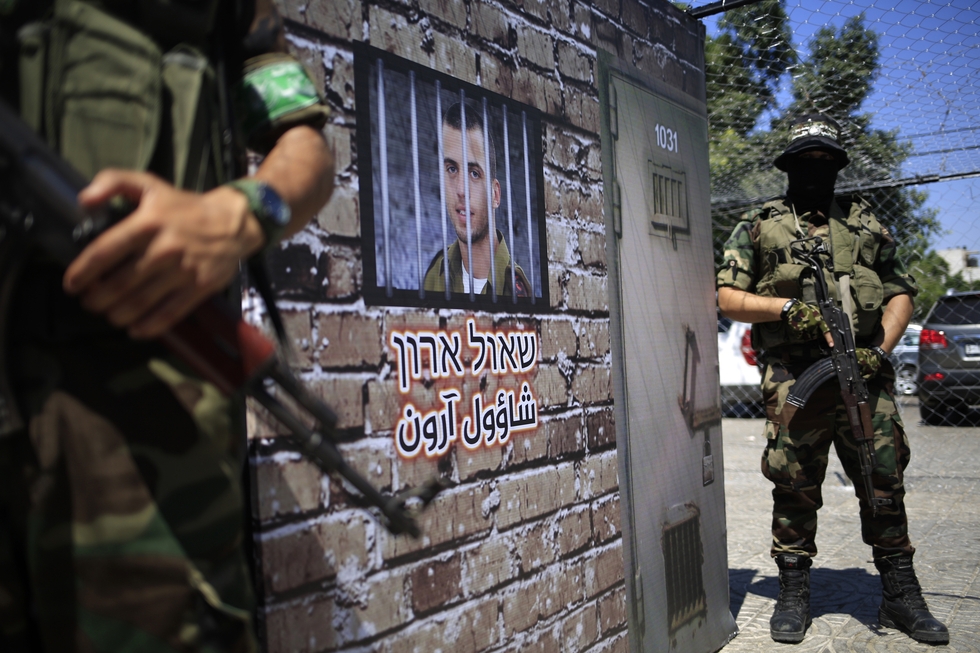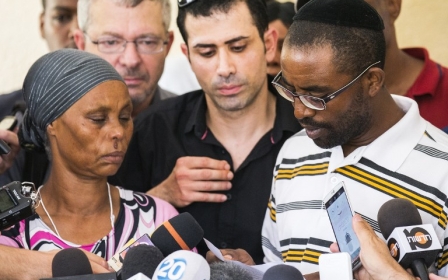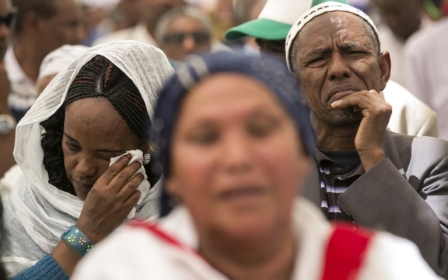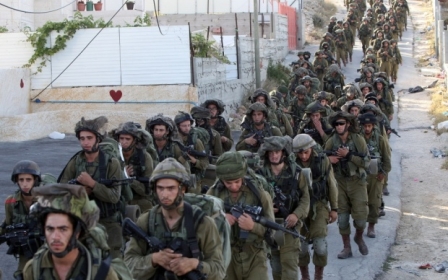Mother of Israeli soldier implores Hamas to give information on him

Zahava Shaul, the mother of Israeli soldier Oron Shaul who was declared killed in action by the army during the summer war on Gaza last year, has asked Hamas for news on her son’s whereabouts.
Shaul, a member of the elite Golani Brigade, was captured by Hamas on 14 July 2014 after an RPG rocket fired by Hamas’s armed wing targeted the tank he was in with six other soldiers, who were all killed.
Hamas later announced they had a soldier in captivity, and read out his dog tags and name.
Holding a press conference on Sunday in the settlement of Poriya, near Tiberias, Zahava Shaul addressed both the Israeli government and Hamas in asking for information on her son’s status.
“I know this has a price,” she said, addressing Hamas political leader Ismail Haniya, adding that in return she will pressure the Israeli government into conducting a prisoner swap “the moment that you provide proof of my son’s true condition”.
Hamas has not given out any information on Shaul after the initial announcement, using the strategy that any news on their part must be met with Israeli concessions on Palestinian prisoners.
When Israeli soldier Gilad Shalit was captured in Gaza in 2006, Hamas provided proof of life over three years later in exchange for the release of 20 female Palestinian prisoners.
Shalit was eventually released in October 2011 in exchange for 1,027 Palestinian prisoners in what was considered as a political victory for Hamas and a blow to Israel. Prime Minister Benjamin Netanyahu had previously reiterated that he will not “negotiate with terrorists” and is keen to avoid a repeat Shalit scenario.
Zahava called for clarification on what happened to her son, saying that Shaul was left on the ground wounded.
“I have taught my son the ethics of army and sent him to defend the state,” she said. “Based on this, I believe that the army does not leave its dead or wounded on the battlefield. The military leaders have to bear the responsibility and bring our son home.”
“It’s important for us to stress that we, the family, have no solid or substantiated information about whether Oron is alive or not, wounded or dead, and we are in a state of uncertainty,” she continued. “The situation as it’s been till now cannot continue. For a year and a half nothing has happened. This has to change.”
On Monday, senior Hamas leader Dr Mahmoud al-Zahar responded by saying that Hamas will not negotiate a new prisoners deal until Israel releases all the prisoners it had originally swapped in the Shalit deal that were later rearrested.
Speaking at a rally commemorating 28 years since the founding of the movement, Zahar said “we won’t say a single word about the destiny of [the captured] Israeli soldiers before Israel frees all prisoners rearrested after they were freed as part of the Shalit-deal."
Israel had rounded up and arrested more than 70 of the released prisoners Zahar referred to in the aftermath of the kidnapping of three settler teens in Gush Etzion, south of the West Bank, in June 2014.
On 3 December, Israel's High Court rejected an appeal against the resentencing of seven Palestinian prisoners previously released in the 2011 prisoner exchange deal.
An Ethiopian Israeli has also been reportedly held in Gaza since September 2014, but his case was only made public months later due to a gag order imposed by the Israeli government.
Avraham Mengistu’s family, who were only allowed to speak to the public about their missing son in July 2015, accused the Israeli government and security forces of “foot-dragging and racism”.
New MEE newsletter: Jerusalem Dispatch
Sign up to get the latest insights and analysis on Israel-Palestine, alongside Turkey Unpacked and other MEE newsletters
Middle East Eye delivers independent and unrivalled coverage and analysis of the Middle East, North Africa and beyond. To learn more about republishing this content and the associated fees, please fill out this form. More about MEE can be found here.




